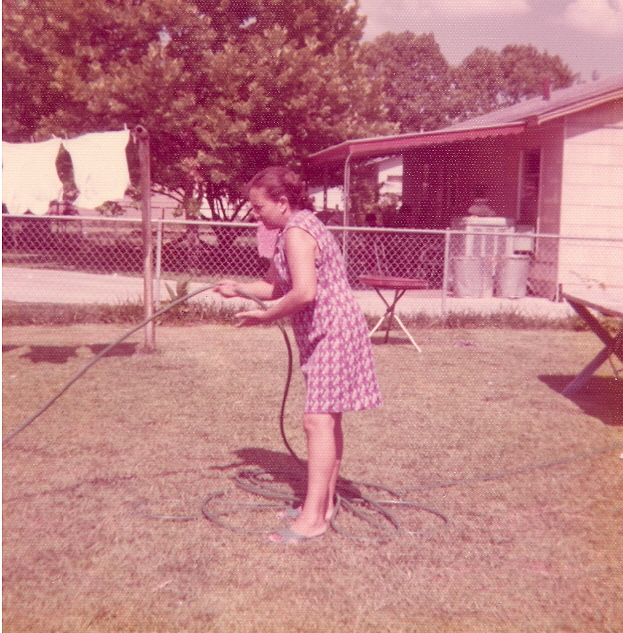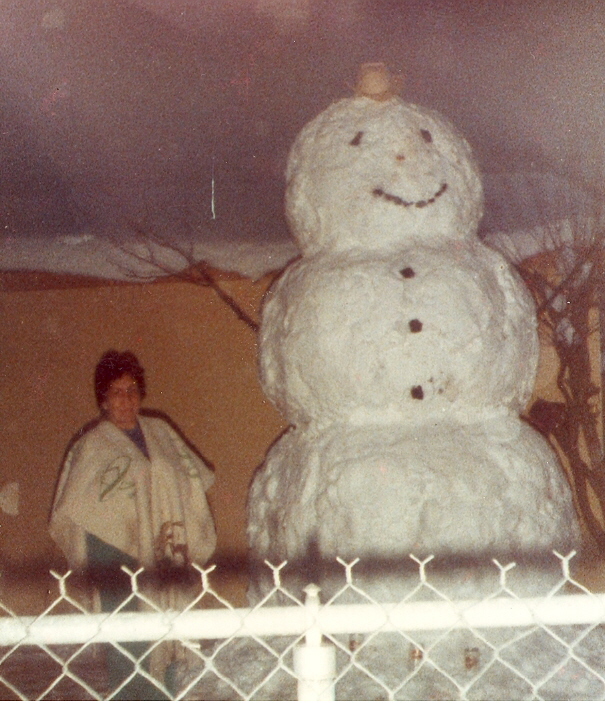TRANSCRIPTION
What was your relationship like with your parents growing up?
Like it used to be back than when the women stayed at home and the man went to work. It was good. My stepfather worked.
What was life like as a little girl?
We were very poor and I did a lot of the errands. My mother would send me to the store to get the things that she needed. My bother would go to school and I would sometimes have to stay home because we didn't have money to pay for my school books.
What did you do after the 3rd grade since you weren't in school anymore?
It was around 1946 when I stopped going to school. They moved the school to far away and I had to walk. I worked for a lady and cleaned her house. I would get paid 10 mexican dollars a month. It came out to 38 mexican cents a day.
Why did you stop going to school?
I had to walk a long dirt curving road going over a hill with a lot of mesquite trees. It was real far and I had to go by myself. It was just too far from where I lived.
Did you want to finish school?
Yes. I wanted to learn.
Did your parents have a car? If not how did you get around?
No. When I was little we walked everywhere but when I got older I took the bus.
What did you do for fun when you were young?
I had played with my friends. I liked to play hopscotch in school and jump rope.
Did your parents work? Where?
Just my step-father in the cole mines in Mexico.
How old were you when you worked your first job?
I was 14 years old.
Did you have any household chores?
I had to wash dishes. In 1951 when my mom was sick I had to wash the clothes. I had to make corn tortillas by hand. When my mom got sick when I was 16 I had to do more of the cleaning.

Why did you get married so young?
My mother had passed away so I had to go live with my step brother and his wife because there was nobody else to stay with. I didn't want to stay with my stepfather, just not seem right.
What was marriage like, since you married young?
It was fine. We were just recently married. My husband was away a lot because of work and would only be home on the weekends.
How did you meet grandpa and where at?
At a dance in Piedras Negras.

What did you do while grandpa worked?
We only lived there for eight months. I stayed home to take care of the kids and grandpa would just leave to work.
How did you get money to support your kids? How much did you get for one check?
Grandpa worked. He worked for a lot of years on the railroad tracks and made more money. He choose to work there because they paid more. In those days there wasn't a lot of needs. We were happy with what we had. We ate whatever we had to eat. There was no McDonalds. In about 1960 we lived in Somerset and he got about 60 dollars a week.

Did you like moving around a lot? Why or why not?
No. In the job grandpa had the company moved him a lot. He worked fixing the railroad tracks. We lived in Von Army and then we moved to Lytle. Instead of moving closer to our family we were moving further away.
When you were young, what were your dreams for when you grew up?
In those days women didn't work outside of our homes or go to college. I never really thought of going to college or getting a job.

 Can you describe your first home you bought or rented?
Can you describe your first home you bought or rented?
We lived in homes for the workers that they rented out to us. I only had Art and Estella with me. It was a two room house. A kitchen and one large room which we used for everything. Like a livingroom and bedroom. It had an outhouse. I don't remember how much we paid for rent. I had a washer but no dryer so I had to hang our clothes outside to dry.
What is something you remember your mother making you for dinner?
Beans, rice, ptotatoes, chili, and meat like carne guisada.
Did you work after you were married? Why or why not?
I used to go help my cousin clean up houses and she would give me money. I worked in California at a tortilleria for one day because someone had quit. I did take care of any older person but just for a few days not very long. I had to raise the kids so that's why I didn't work a lot.
Did you buy or make your clothes?
I bought it or would buy material and send it to have made.
Who taught you how to cook or did you learn on your own?
My mother taught me a little and when I married I learned more on my own.
Did you know how to drive?
I never did learn because I was always busy cooking or cleaning so I just never had time to learn but I was afraid of learning to drive.
What was the first car you bought?
It was a 1937 black Chevy car. It was a used car my bother-in-law sold to us.
Do you wish you could have changed anything in your life?
No. I just would have liked to be able to turn back into time when grandpa was alive.

